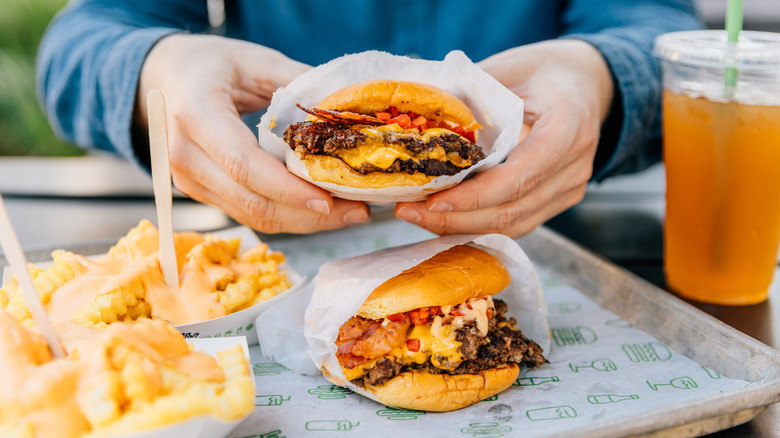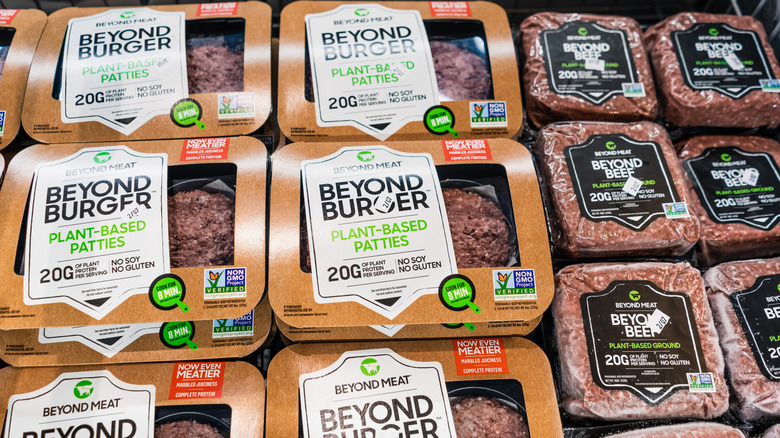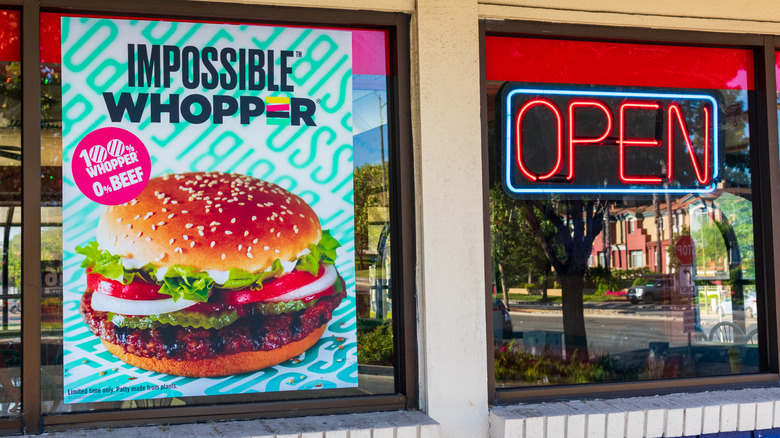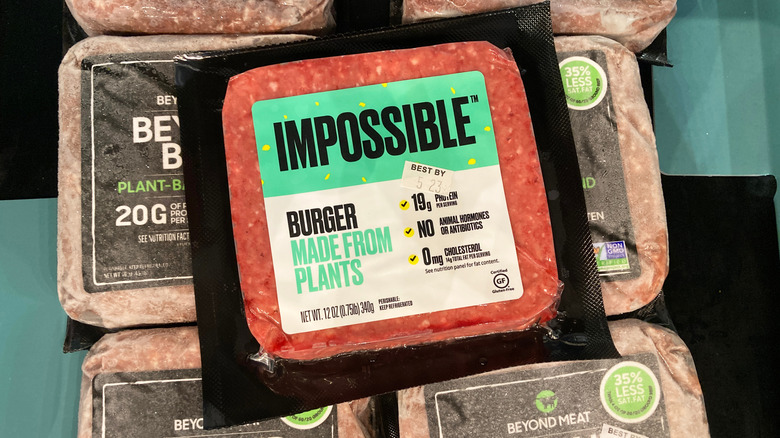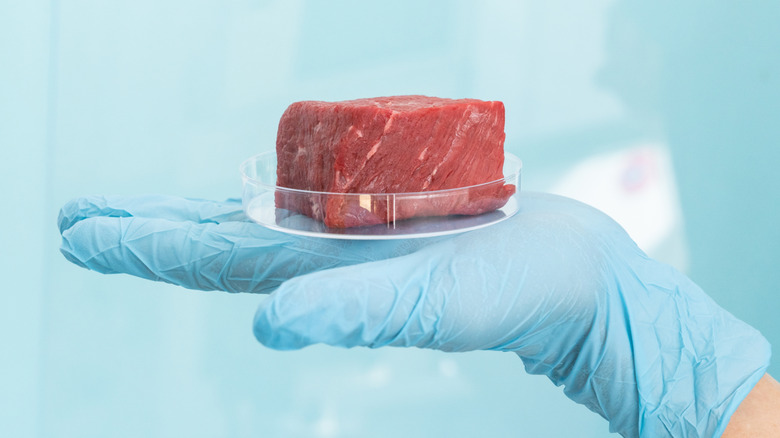The Story Behind Fake Meat And Its Quick Downfall
Fake meat has been around for centuries. All the way back in Ancient China, Buddhist monks were devising vegetarian dishes that resembled meat in order to adhere to their principles of non-violence. Centuries later, during the Han Dynasty (which took place between 206 B.C. and A.D. 220), tofu was invented. In the U.S., the health-crazed Kellogg brothers, who would make a fortune on breakfast cereal, created a peanut-based meat alternative they called Nuttose, which they served their patients at the sanitorium they ran in Michigan. Garden Burgers were invented in the '80s, Quorn came not long after, and in the early 2000s, fast food chains like Burger King and McDonald's began testing out meatless burgers on their menus.
Despite this extensive history, fake meat exploded so rapidly in the late 2010s that it almost felt like a new invention. All of a sudden, vegan meat wasn't just the domain of the vegetarians or the hippies — it was mainstream. Companies like Impossible Foods and Beyond Meat became the darlings of the stock market, and it seemed as if the trend was here to stay. In recent years, however, the demand for fake meat has cratered. Far from being the protein of choice, it's disappearing from menus and its manufacturers are slashing their workforces. We're taking a look back at the rapid rise of this niche of the food industry to find out why it plummeted so quickly. As it turns out, it wasn't that surprising after all.
Plant-based meat underwent a revolution
One of the main reasons fake meat took so long to hit the mainstream was that it wasn't fooling anyone. From cardboardy burger patties that were very visibly made of grain and legumes to rubbery strips of "bacon" that neither tasted nor smelled or felt like anything approaching ham, the options just weren't enticing enough to convince meat-eaters or would-be vegetarians that they wouldn't miss real meat. But then, in the 2010s, two companies began experimenting with making fake meat that actually tasted and looked like meat.
Founded in 2009, Beyond Meat was one of the first companies to make this its mission, and it got to work in the lab breaking down plants and trying to reassemble them into something that fit the bill. Meanwhile, Impossible Foods set out with a similar mission, but staked their success on a single iron-based molecule called heme that is found in beef in high concentrations. By genetically modifying yeast, Impossible was able to manufacture heme without meat products to produce a blood-like substance packed with meaty flavor that could ooze from its burgers like the real deal. Gone were the days of rubbery tofu chicken nuggets and chickpea burgers. Thanks to this lab-based approach to vegan meat, the industry got a glow-up.
The meat industry is terrible for the environment
One of the main selling points of fake meat (aside from preventing the killing of animals) is its low impact on the environment. There is no getting around the fact that the meat industry is one of the key drivers of climate change. A 2021 study in the journal Nature concluded that meat production accounts for 57% of greenhouse gas emissions from food production, which in turn accounts for 35% of all global emissions. Beef alone accounts for a quarter of the emissions of the food production industry. Livestock produce methane, which is a major contributor to these emissions, but the land requirement is also a big factor. Huge portions of forests are leveled every year to make room for the livestock, and further swathes of land are cleared to create room to grow food for the livestock.
Compared to the 29% of food industry emissions caused by plant-based options, the meat industry is clearly worse for the environment. When companies like Beyond Meat and Impossible Foods began producing food options that approximated real meat, consumers who were concerned about the environment had a viable alternative to put in their shopping carts.
Plant-based meat sales were sky-high in the late 2010s
To get a sense for just how popular these vegan meat alternatives were, we have to go back to 2019. In May, Beyond Meat went public on the stock market, and its share price catapulted 163% in a single day, the fastest for an American company in nearly 20 years. Wall Street was caught up in the hype surrounding the company, and prognosticators were equally bullish. In 2021, the Boston Consulting Group, one of the world's top consulting firms, predicted that the industry would grow from selling 13 million metric tons of products a year to a staggering 97 million metric tons by 2035.
The company had reason to be confident. Between 2018 and 2020, sales of plant-based meat grew by about 38%, and industry watchers were confident that the products would rapidly adapt to market demand, and become more affordable and more meat-like.
Fast food chains joined the frenzy
Despite having built their empires on the meat industry, fast food companies were eager to join the fake meat trend. Burger King was the earliest adopter, introducing the Impossible Whopper to its restaurants nationwide in mid-2019 after a few months of testing in a handful of places around the country. Using patties from Impossible Foods, the chain was confident enough in the product that it suggested customers purchase one of each –- the classic beef Whopper and the Impossible Whopper -– to see if they could taste the difference. One of the main factors that convinced the company to bring the vegan burger to restaurants nationwide was the fact that it was bringing in new customers who had never set foot in a Burger King until then. Not only was the chain hoping to change the preferences of their regular customers, but they were hoping to attract a new demographic of consumers as well.
Beyond Meat had even bigger success in the fast food industry. That same year, chains including Del Taco, Dunkin', and Carl's Jr. were offering menu items that used its products. Three years later, McDonald's debuted its McPlant Burger, which used the Beyond Meat patty and was available at restaurants in California and Texas.
It got political
The love affair didn't last long. There are many reasons -– proven and suspected –- for why plant-based meat began to lose its luster, but one of the most intractable was politics. Companies like Impossible Foods and Beyond Meat became so wildly popular that they became more than just food brands, but cultural symbols. The fact that they created a new template for how animal and environmentally friendly proteins could appeal to the mainstream was a source of celebration for many, but it also became a source of rage for another portion of consumers who relegated it to liberal propaganda. The companies were trying to break out of the vegan and vegetarian markets and into the omnivore market, but instead, they ended up in the middle of a culture war.
In 2023, Impossible Foods announced that it was rebranding, swapping its green packaging for a deep red, all-caps font, presumably to distance itself from any affiliation with environmental concerns and towards a cliché idea of the red-blooded, steak-guzzling American consumer. Speaking at an Adweek X conference that year, Impossible's CEO stated that the company needed to be more "inclusive" and reject the "wokeness" that it had become associated with. In the wake of far-right documentaries spreading conspiracy theories about how the so-called liberal elite were trying to weaken the global population by cutting off their access to meat, his questionable and wording seemed almost tame.
Customers didn't come back for seconds
A more urgent problem for the plant-based meat industry was that it was hemorrhaging customers. The enthusiasm for plant-based products between 2019 and 2021 was, it turned out, largely due to first-time buyers. Perhaps the excitement surrounding the companies' innovations inspired meat-eating stalwarts to give the products a chance, only to decide, inevitably, that they preferred real meat. In 2022, Maple Leaf, a Canadian pork company that also owns two plant-based meat brands, conducted a review of the U.S. market and concluded that the industry was stalling. About 60% of U.S. households had given plant-based meat a try, leading to skyrocketing sales, but so few of them had turned into repeat customers that sales flattened.
The expectation that plant-based meat would only become increasingly popular as more people tried it proved to be unfounded, leaving the companies in a tricky spot with investors and shareholders.
Plant-based meat is ultra-processed
Another driver of the plant-based meat craze was the idea that protein made from plants must be healthier than regular meat. Studies have consistently shown that consuming red meat, both processed and unprocessed, can shorten the lifespan. In 2012, researchers from Harvard estimated that swapping one serving of red meat with healthier options like fish, poultry, and nuts every day could lower the risk of mortality between 7 and 19%. If you're craving a hamburger or a hot dog, it stands to reason that a Beyond Burger or a plant-based sausage would be a better option.
However, it didn't take long for health professionals to point out that many of the most popular plant-based meat companies rely on ultra-processing and excessive amounts of unhealthy ingredients like salt and saturated fats to achieve the meat-like texture and flavor of their products. Where a beef patty might contain only one or two ingredients, a plant-based patty might contain 20 or more. Recent studies have shown that the regular consumption of ultra-processed foods increases a person's risk of cancer and early mortality.
Comparing the fat and calorie content of fast food meat burgers with popular plant-based burgers is equally sobering. For example, a McDonald's Quarter Pounder has 420 and 18 grams of fat, eight of which are saturated fats, including the bun. In contrast, a plant-based patty from Moving Mountains without a bun has 270 calories and 20 grams of fat, a whopping 18 of which are saturated.
It's expensive
Health concerns aside, plant-based meat is just plain pricey, even compared to regular meat. Initially, the novelty of the products likely allowed customers to overlook the price tag, but not in the long term. When the Boston Consulting Group predicted exponential growth in the sector through 2035, it highlighted the fact that plant-based meat would grow more affordable in the coming years, anticipating that it would be equal to meat in the near-distant future. In the cost of living crisis that emerged after the coronavirus pandemic, however, consumers didn't have the luxury of waiting for this to happen. When even the cheapest and least flavorful plant-based meat products continued to be more expensive than the real thing, sales began to slump.
This was a particular problem for the companies because 95% of people who had been fans of plant-based products were also meat-eaters. When affordability became a primary concern, the choice to switch back to regular meat was a no-brainer.
Sales and stocks slumped
Through this combination of factors, plant-based meat sales began to plummet. In August of 2023, the CEO of Beyond Meat broke the news to investors that its sales had fallen more than 30% in the past quarter compared to the previous year, prompting its shares to fall by 12%. Far from being on track for growth as had been predicted, the company was shrinking. The landscape for the rest of the industry was nearly as bleak.
It wasn't that vegan and vegetarian products had grown less popular, it was that fake meat, specifically, was losing its shine. A 2023 survey from the vegan company Strong Roots found that 61% of global consumers were trying to increase their plant-based intake, even as 40% of respondents were reducing or eliminating plant-based meat from their diets (via the BBC). This statistic suggests that fake meat has gained a negative reputation even as consumers embrace eating less meat.
Fast food chains discontinued vegan options
As fake meat sales began to falter, the fast food chains that had been so instrumental in their meteoric rise began to quietly remove faux meat from their menus. First, it was Dunkin', which had been an early adopter. Having introduced Beyond Meat's sausage patties to its menus in 2019, it quietly discontinued the option in 2021, long before the sharp decline of the fake meat sector had taken hold.
Then came the McPlant. It had never really been a success for McDonalds. Not long after the burger made its debut in California and Texas in 2022, the company announced that it would not be expanding the product to other parts of the country even as its competitors, such as the Impossible Whopper, were fixtures on menus around the nation. There is no specific reason that the McPlant never managed to get off the ground, but its slightly higher price point might have had something to do with it. Additionally, the chain's use of vegan cheese might have been a turn-off for some customers who were either vegetarian or meat-eaters just trying it out. In 2024, Carl's Jr. and Del Taco slashed fake meat from their menus, too.
Finally, in 2024, the CEO of Burger King revealed that, despite the initial success and continued availability of the Impossible Whopper, the company would not be expanding its plant-based options in the U.S. anytime soon.
Brands began laying off workers and filing for bankruptcy
Given how quickly the tide turned on fake meat, it's no surprise that the company's behind the trend began hemorrhaging money and, consequently, laying off staff. In 2022, Beyond Meat made its first major cut, culling 19% of its workforce, about 200 employees. A year later, it slashed another 19% of jobs, this time equaling about 65 workers. It explained that the move was part of a bigger reset, in which certain product lines would be pulled from shelves and the manufacturing process would be reassessed. Impossible Foods followed suit, laying off 20% of its workforce in 2023.
Elsewhere, plant-based companies weren't just tightening their belts, but closing shop. The Very Good Food Company shuttered in 2023, while the British company Meatless Farm and the U.S. company Tattooed Chef filed for bankruptcy that same year. Faced with slowing sales and unenthusiastic investors, many once-fawned over brands were left to drown or completely reinvent themselves on a much more modest scale.
It was a victim of its own success
For all the talk surrounding the rapid decline of the fake meat industry, it's important to keep things in perspective. In many ways, it was simply a victim of its own success. For one thing, food margins are notoriously low compared to, for example, successful tech startups of Silicon Valley. The fact that they gained immense popularity and were tapped for practically unheard of growth for the food industry is a sign that investors got overly excited and saddled them with impossibly high expectations. When these brands fell short of such lofty predictions, it was merely an indication of the unrealistic nature of the investors rather than evidence that the entire enterprise was a misjudged one.
The excessive hype backfired. When relatively young brands like Beyond Meat and Impossible Foods were flooded with money, they hadn't yet found their footing. They were forced to grow rapidly rather than have the time to experiment with new formulas and find cheaper ways to produce their products. It's hardly surprising that, in this environment, so many of them flamed out before they could fully develop.
Lab-grown meat could be the next big thing
The hunt for vegan meat is just as hot as ever, even as plant-based meat is struggling to regain its favorable position. As it stumbles over its latest hurdle, however, a new kid on the block might give it a run for its money. Lab-grown meat is positioning itself to be the next great solution to the environmental fallout caused by the meat industry. Grown from animal cells, It does not require the raising or killing of animals, but is identical to the real deal. It could be the holy grail that the food industry has been waiting for –- real meat that doesn't actually involve meat farming. But it remains expensive and will likely take years to become an affordable, everyday item sold at grocery stores.
Despite using animal cells and identical proteins, lab-grown meat still lacks the texture of farmed meat, and the current minimum cost for producing a single burger patty this way is about $10. Still, the U.S. has approved the sale of lab-grown meat for human consumption, and there are a few restaurants where you can try it yourself. In the meantime, the plant-based meat industry will need to get its foot back in the door before its lab-grown competition becomes ubiquitous.
Europeans are still eating plant-based meat
Negative headlines aside, there is a silver lining for the plant-based meat industry, and it's called Europe. Even as Americans tried fake meat once or twice and gave it up for regular meat, Europeans have become loyal buyers. When Beyond Meat announced that its earnings had dropped by 9% at the end of 2023, it also noted that its business in Europe was actually growing. Its international retail sales were up 39% and its international food service sales were up a whopping 79%. It attributed this rise to the European market and the chicken nuggets it sells through McDonald's (a menu item not available in the U.S.).
Europeans tend to eat less meat than Americans on average, making the market for non-meat protein alternatives much more fertile. Additionally, several supermarket chains in the EU and U.K. have committed to cutting prices of plant-based meat products to fall in line with farmed meat. Despite being a much smaller market than the U.S., Europe is a much more inviting place for vegan meat brands than North America, at least for now.

